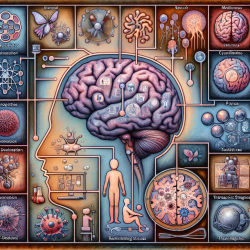Introduction
In the realm of speech-language pathology, understanding the intricate mechanisms of neurodegenerative diseases like Alzheimer's can offer profound insights into therapeutic interventions. A recent review titled The Potential Role of Cytokines and Growth Factors in the Pathogenesis of Alzheimer’s Disease delves into the roles of cytokines and growth factors in neuroinflammation and their implications for therapeutic strategies. This blog aims to translate these findings into actionable insights for practitioners in speech-language pathology, particularly those focused on pediatric populations.
The Role of Cytokines and Growth Factors
Cytokines and growth factors are pivotal in maintaining central nervous system (CNS) homeostasis. In Alzheimer's disease (AD), the aberrant behavior of these molecules contributes to neuroinflammation and neuronal decline. Understanding these mechanisms is crucial for speech-language pathologists, as similar pathways may influence neurodevelopmental disorders in children.
Key findings from the research highlight:
- Cytokines: These non-structural proteins, such as interleukins and tumor necrosis factors, play roles in cell proliferation and apoptosis. Their dysregulation is a hallmark of neuroinflammation in AD.
- Growth Factors: Proteins like nerve growth factors (NGF) and vascular endothelial growth factors (VEGF) are essential for cell survival and brain development. Their impaired function can exacerbate neurodegenerative processes.
Implications for Speech-Language Pathology
While the primary focus of the study is on Alzheimer's, the insights gained can inform therapeutic approaches for children with speech and language disorders. Here’s how:
- Early Detection: Understanding cytokine and growth factor pathways can aid in the early detection of neurodevelopmental disorders, allowing for timely intervention.
- Targeted Therapies: Therapies that modulate cytokine activity could potentially improve outcomes in children with conditions characterized by neuroinflammation.
- Holistic Approaches: Integrating knowledge of neuroinflammation into therapy plans can lead to more comprehensive care strategies, addressing both communication and underlying neurological health.
Encouraging Further Research
For practitioners, staying abreast of research in related fields is vital. The intricate dance of cytokines and growth factors in neuroinflammation is a burgeoning area of study that promises to unlock new therapeutic avenues. Engaging with this research can inspire innovative approaches to therapy and enhance the efficacy of interventions.
Conclusion
The interplay of cytokines and growth factors in neurodegenerative diseases like Alzheimer's provides a valuable lens through which to view and treat speech and language disorders. By integrating these insights into practice, speech-language pathologists can contribute to improved outcomes for children, fostering better communication and cognitive development.
To read the original research paper, please follow this link: The Potential Role of Cytokines and Growth Factors in the Pathogenesis of Alzheimer’s Disease.










